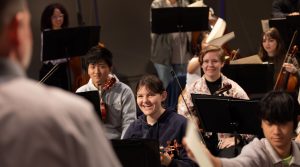
CELEBRATE FAILURE: TEACH THROUGH MUSIC
Curated from YAMAHA – by Jayme K. Hayes –
ACCEPTING FAILURE IS CRUCIAL TO HELPING STUDENTS BECOME LIFELONG LEARNERS WHO ARE SELF-MOTIVATED TO SUCCEED.
We all fear the horrible F word — failure. Who wants to fail at something? How often do people purposefully put effort into failing? It is something we avoid at all costs, are ashamed of, or even lie about, right? So why am I writing an article about celebrating failure?
Let’s talk about failure, and what I mean when I say we should celebrate failure in our classroom. In his book, “Failure: Why Science Is So Successful,” Stuart Firestein says “Although ignorance and failure are commonly thought of in a negative light, in science they are just the opposite: They are where all the interesting action is.”
Think about the scientific method: You write a hypothesis, conduct the experiment and analyze the outcome. Physicist Enrico Fermi is quoted in Firestein’s book, “If your experiments succeed in proving the hypothesis, you have made a measurement; if they fail to prove the hypothesis, you have made a discovery.”
How do we create this space of discovery in our classes for different ages and levels of playing?
HARMFUL FAILURE
First, let’s address those failures that are harmful or even life altering. We miss deadlines and lose our job, we run a red light and get into an accident, a surgeon makes a fatal mistake during surgery, we get angry and break something, we overspend and overdraft our bank account.
This article is not about these types of harmful failures that are very difficult to come back from. These failures can be unforgiveable, unacceptable and should be avoided at all costs. Hopefully, we are taught the skills to avoid them.
However, we must respect that these failures are real and realize that this article is about education and how to develop lifelong learners who are self-motivated to succeed. Accepting failure is crucial to helping our students develop these skills.
FANTASY VS. REALITY
 When I first became a teacher, I believed that anything less than the top rating at festival meant I was a failure. I had this fantasy about what it meant to be a band teacher. I was going to have the best groups in the area! I was this fun, energetic teacher, my kids would love me, and in turn, they would be amazing musicians simply because I was the person in front of them. I would teach them how to play faster, higher, louder, with more emotion, in tune, with balance. I was going to get my name out there! Thankfully, I learned pretty quickly that this was not reality.
When I first became a teacher, I believed that anything less than the top rating at festival meant I was a failure. I had this fantasy about what it meant to be a band teacher. I was going to have the best groups in the area! I was this fun, energetic teacher, my kids would love me, and in turn, they would be amazing musicians simply because I was the person in front of them. I would teach them how to play faster, higher, louder, with more emotion, in tune, with balance. I was going to get my name out there! Thankfully, I learned pretty quickly that this was not reality.
Reality was hearing students say that they can’t, they aren’t good enough, they’re just bad at it, they’re smart enough, they just don’t get it, it’s too hard. I’m not exaggerating when I say that I heard almost all of these comments every single day during my first two years of teaching, sometimes from my best players. I had no idea how to get through to them, how to help them see what I saw: their potential. It was exhausting.
How was I supposed to show them how to work through the hard stuff to get to the good stuff? How do you do that when they are ready to quit the second a challenge comes their way?
CHANGING THE NARRATIVE
 I remember talking to a veteran teacher from a neighboring district about this. He told me, “Kids are just different nowadays. They don’t try any more, they give up and they want everything handed to them. They’re lazy.”
I remember talking to a veteran teacher from a neighboring district about this. He told me, “Kids are just different nowadays. They don’t try any more, they give up and they want everything handed to them. They’re lazy.”
Thankfully, our conversation ended shortly after he said this. I took what he said and refused to accept it! But the wheels started turning. I soon realized what the problem was for my students and for many students — I was teaching music to them rather than teaching them through music.
I changed the narrative in my classroom. We started talking about our mistakes outside of class first. I would share with them mistakes I had made the day prior. This became a daily routine at the beginning of every single class. Things started out small, students would share things like forgetting to wipe the table after dinner, missing three questions on their math test, forgetting to remind their mom about practice tonight. Then we started to talk about mistakes we made in the music.
The students already felt comfortable talking about the little mistakes they made in their personal lives and how they would learn from them. When we started incorporating mistakes made in class, they automatically shared what they would do to fix that mistake next time. They immediately began to analyze their own music and playing. Unintended benefit right there!
OVERCOMING MY FEAR
I was afraid for my students to hear me sound bad on an instrument. I thought I had to keep up this persona that I could play all the instruments well. I seriously don’t know where this mentality came from.
I am a tuba player, so I started with brass. I began playing the trumpet more often. One day in class, I commented to my trumpet section that a particular part of their music sounded so much better. A student from the section responded, “Yeah, we were talking about your trumpet playing the other day. You’re getting better, and we weren’t okay with you sounding better than us, so we had a sectional this weekend.”
I kept my cool, but I wanted to scream to the world that my kids held their own sectional and improved! This became a regular occurrence in all the sections without me implementing or pushing for anything. The students simply took charge.
FROM NOISE TO MUSIC
 Have you ever taught a beginning band or orchestra class? Those first few weeks can be, well, interesting. Those beautiful colorful sounds, screeches, squawks and flubber sounds happen regularly, but we know that they will turn into music soon. We know these noises are part of our students developing their embouchures, bow holds, finger placement.
Have you ever taught a beginning band or orchestra class? Those first few weeks can be, well, interesting. Those beautiful colorful sounds, screeches, squawks and flubber sounds happen regularly, but we know that they will turn into music soon. We know these noises are part of our students developing their embouchures, bow holds, finger placement.
Failure is literally built into beginning band and orchestra. On what day in their learning did we decide that failure is no longer acceptable? Why?
Oftentimes, we do not even realize we stopped accepting those failures. We begin the internal, or sometimes external, monologue that they should know this already, we’ve been doing it for weeks, they never practice, why is the trumpet section still missing that F sharp? Will my clarinets ever play a B natural instead of a B flat without me telling them?
Many of us stop accepting the failures as part of the learning and begin dictating what’s right and wrong. I still find myself falling back into this, especially right before a concert or festival.
I WANT TO HEAR YOUR MISTAKES
 How often have you said to a student or section that is not playing or singing out, “I want to hear your mistakes” and meant it? How many times have you said this during rehearsal, and when that mistake happened, you stopped the group and made a comment on the right note or rhythm? Have you ever heard those mistakes and literally applauded that student or section? If not, try it, genuinely.
How often have you said to a student or section that is not playing or singing out, “I want to hear your mistakes” and meant it? How many times have you said this during rehearsal, and when that mistake happened, you stopped the group and made a comment on the right note or rhythm? Have you ever heard those mistakes and literally applauded that student or section? If not, try it, genuinely.
I encourage you to say you want something and then accept it with open arms. After you thank them for playing out and allowing you to hear it, then you can kindly fix it. The next time, they will play a mistake so you can fix it before the concert. We have all had that one student who waits until the concert performance to finally play out.
Before my students sight read a new line in their book or a new piece, we go through the regular criteria: key signature, time signature, rhythms, notes, etc. We have an organized process and check all the boxes.
Before we play the first note, I always ask, “Are you going to make mistakes?” to which my students yell, “Yes!”
“Are you going to stop playing and put your instrument down?”
“No!”
“Good, let’s begin.”
Once I started this call-and-response, my students quit putting their instruments down and giving up. They stopped saying, “I can’t.” In fact, I have not heard those words from any of my non-first year students in the last three years. It is no longer a part of our class. I am hearing it less and less in my beginning groups, too.
PERFECTION IS NOT OUR GOAL
On playing assessment days, I go down the row and the students play one by one. I kindly tell those who freeze up that I will come back to them and suggest they finger along, and I keep going. Not only does this keep up the momentum, but it allows students to know that they can try again. Plus, other students who may be freaking out as their turn is coming up are reminded that this is a safe place.
Every time I come back to a student, they do better than their first attempt. No one has ever been upset that someone else got a second try. The support for each other to succeed is there.
Of course, we talk about the reality of performances and how we do not get a second chance, and that even professional musicians make mistakes during concerts. We need to teach our students that perfection is not our goal, nor is it realistic. The more they can play through a mistake and anticipate them, the more successful they will be. Hearing conductor, composer and educator Jack Stamp talk about mistakes and the unrealistic expectation for musicians when compared to sports and academics was life changing for me.
TURNING FAILURE INTO SUCCESS
 Have you ever taught students how to improvise or compose? During these two processes that are highly dependent on failure, we learn what we like and what we don’t. We sometimes use a process of elimination as we work through the kinks.
Have you ever taught students how to improvise or compose? During these two processes that are highly dependent on failure, we learn what we like and what we don’t. We sometimes use a process of elimination as we work through the kinks.
As students are learning the 12-bar blues, they are singing the bass line and imagining what their solo will sound like. Then they pick up their instrument and play … and it sounds nothing like what they imagined. They can either give up, never try again, or keep going to find out what works and what doesn’t.
A past teacher of mine once told me, “There is no wrong note in jazz, just hold it ‘til it becomes the right note.”
Of course, I am aware this is not a rule we should live by, but the idea behind it is golden. Why is that note wrong now but right later on? When that wrong note finally sounds amazing in a different chord, that failure became a success, and students learn to love when it clicks. They need to work through those mistakes and failures. As Jennifer Lim says, “Mistakes are proof that you are trying.”
When we celebrate our students’ failures, we show them that their value is not connected only to their successes. They are valued for simply being themselves. This does not mean failures are not painful, it just means that they are not the end of something.
Students must learn from failure, and when we create a dialogue in our classrooms that we accept failure, students learn to accept them as well. They learn to be resilient and to have “grit,” the magical word that we hear all the time in staff meetings and training.
Students learn how to work through tough situations, knowing that if they keep going, they will be successful. They will be okay with not always being the best because they know if they keep trying, they can be.
Celebrate their failures, and you will begin to teach them through music instead of just teaching music to them.
